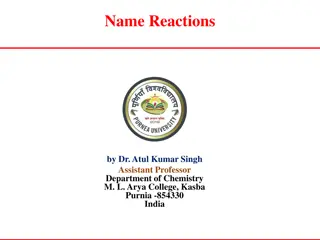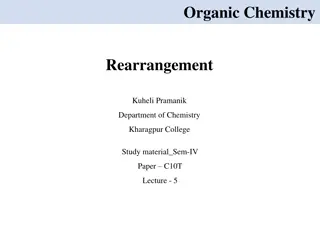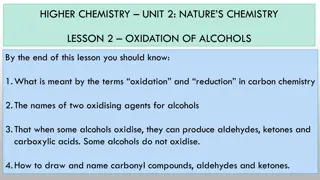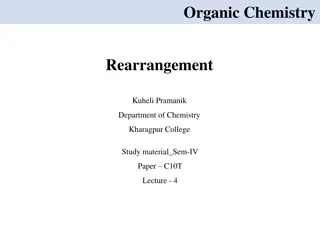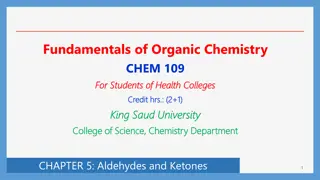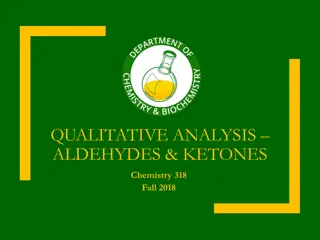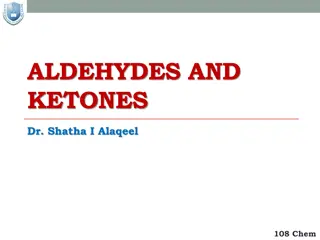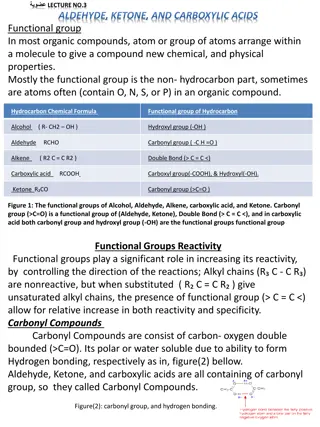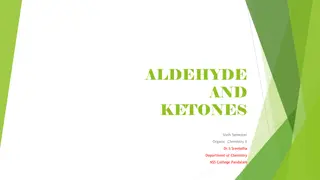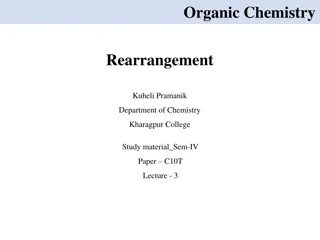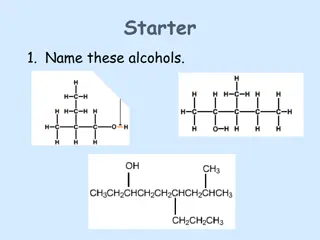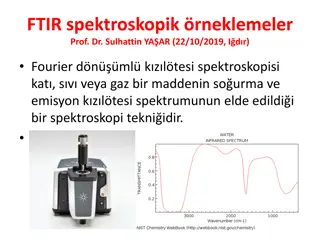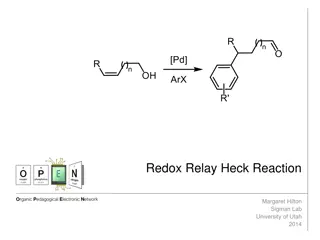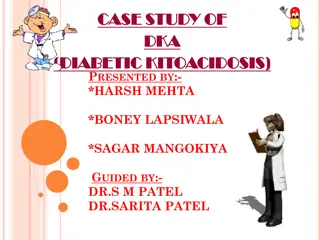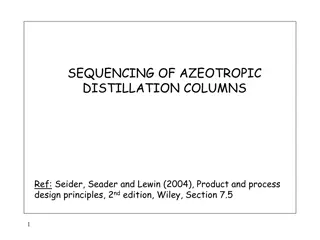Aldol Condensation Reaction: Preparation of Chalcones
Chalcones are important unsaturated aromatic ketones that serve as biogenetic precursors of flavonoids and isoflavonoids. They have various medicinal and pharmaceutical applications due to their biological activities. Chalcones are easily synthesized compounds with potential therapeutic uses, making
3 views • 13 slides
Benzoin Condensation: A Name Reaction Explained by Dr. Atul Kumar Singh
Benzoin condensation is a classic organic reaction where aromatic aldehydes self-condense to form α-hydroxy ketones. Dr. Atul Kumar Singh, an Assistant Professor of Chemistry, details the mechanism and the specific catalytic properties of cyanide in this reaction. The reaction involves refluxing th
0 views • 6 slides
Favorskii Rearrangement in Organic Chemistry
Favorskii rearrangement is a base-catalyzed rearrangement reaction of halo ketones giving rise to acid, ester, or amine compounds via a cyclopropane intermediate. The mechanism, evidence supporting it, variations in reaction based on the presence of hydrogen, and stereospecificity are discussed with
0 views • 8 slides
Oxidation of Alcohols in Carbon Chemistry
Oxidation of alcohols involves either adding oxygen or removing hydrogen in carbon compounds, leading to the production of aldehydes, ketones, and carboxylic acids. Primary alcohols can oxidize further to produce aldehydes and carboxylic acids, while secondary alcohols form ketones. Tertiary alcohol
1 views • 13 slides
Dakin Rearrangement in Organic Chemistry: Mechanism and Positional Effects
The Dakin Rearrangement, also known as Dakin oxidation, is an organic redox reaction involving hydroxylated phenyl aldehydes or ketones reacting with hydrogen peroxide to form benzenediols and carboxylates. The mechanism includes nucleophilic addition, [1,2]-aryl migration, and final product formati
2 views • 9 slides
Aroma Chemicals Market Expected to Soar with Surge in Organic and Natural Produc
Aroma Chemicals Market; By Source(Synthetic, Natural, Natural-Identical), By Products(Benzenoids, Terpenes and Terpenoids, Musk Chemicals, Others) (Ketones, Esters, Aldehydes), Application, Flavors, Convenience Foods, Confectionery, Dairy Products, B
0 views • 4 slides
Organic Chemistry Fundamentals: Aldehydes and Ketones
The chapter explores aldehydes and ketones, common classes of carbonyl compounds, the structure of the carbonyl group, and the nomenclature of aldehydes according to the IUPAC system. It discusses the characteristics, bonding, and nomenclature rules associated with these important functional groups
0 views • 22 slides
Qualitative Analysis of Aldehydes and Ketones in Chemistry Lab
In this Chemistry 318 lab, students will conduct qualitative analysis of aldehydes and ketones using chemical and spectroscopic methods. The lab includes classification tests, spectroscopy (IR, 1H-NMR/13C-NMR, MS), and identification of unknown compounds. Experimental procedures involve physical eva
2 views • 11 slides
Aldol Condensation Reaction for Benzalacetophenone Preparation
Aldol condensation is a key reaction for preparing benzalacetophenone, also known as chalcones. Chalcones are unsaturated aromatic ketones with various medicinal applications, showcasing activities like anti-diabetic, anti-inflammatory, and anti-bacterial effects. The reaction involves combining ben
0 views • 10 slides
Aldehydes and Ketones in Organic Chemistry
This chapter discusses carbonyl compounds focusing on aldehydes and ketones. It covers their structural differences, drawing, nomenclature, physical properties, synthesis methods, and nucleophilic attack reactions. Additionally, it includes common classes of carbonyl compounds, naming conventions fo
1 views • 21 slides
Aldehydes, Ketones, and Carboxylic Acids in Organic Chemistry
Functional groups like aldehyde, ketone, and carboxylic acids play a crucial role in organic compounds, influencing reactivity and properties. Carbonyl compounds containing carbon-oxygen double bonds exhibit unique characteristics. Ketone bodies have biological significance, especially in conditions
0 views • 12 slides
Aldehydes and Ketones in Organic Chemistry
Aldehydes and ketones are compounds that contain carbonyl groups (>C=O). Aldehydes have the CO group linked to either two hydrogen atoms or one hydrogen atom and one alkyl or aryl group, while ketones have the CO group linked to two alkyl or aryl groups. The structure of the carbonyl group is charac
2 views • 26 slides
Baeyer-Villiger Oxidation: Mechanism and Migration Aptitude
The Baeyer-Villiger oxidation is a key organic reaction that transforms ketones into esters or cyclic ketones into lactones using peroxyacids. The mechanism involves protonation of the carbonyl group and migration of substituents. Migration aptitude in this reaction determines the regioselectivity,
0 views • 10 slides
Essential Oils: Properties, Chemistry, and Uses
Explore the fascinating world of essential oils, from their properties and uses to the chemistry behind their distinctive aromas. Learn about terpenes, key components in essential oils, and discover their modern applications in cosmetics, cleaning, flavors, and more. Understand what essential oils a
0 views • 36 slides
Alcohol Oxidation in Organic Chemistry
Explore the oxidation of alcohols in organic chemistry through a series of experiments involving primary, secondary, and tertiary alcohols. Learn how different alcohols react and identify the products of oxidation reactions. Understand the distinctions between aldehydes, ketones, and the classificat
0 views • 31 slides
Fourier Transform Infrared (FTIR) Spectroscopy Examples by Prof. Dr. Sulhattin YAŞAR
Fourier Transform Infrared (FTIR) spectroscopy is a technique used to obtain the absorption and emission spectra of solid, liquid, or gas substances. This content provides characteristic absorption peaks for various functional groups, such as alkane, alkyl, alkenyl, alkynyl, aromatic compounds, alco
0 views • 15 slides
Organic Chemistry: Functional Groups and Naming Rules
Delve into the world of organic chemistry with a focus on functional groups like alcohols, ethers, aldehydes, and ketones. Explore the rules for naming these compounds, understanding their structures, and how they impact the properties of molecules. From alcohols with hydroxy groups to ketones conta
0 views • 21 slides
Organic Chemistry Reactions and Synthesis Overview
Explore a comprehensive overview of organic chemistry reactions, including esterification, oxidation, hydroboration, and reductions like Wolff-Kishner and Clemmensen. Dive into compound classifications such as carboxylic acids, ketones, and acid chlorides. Learn about key reagents and reactions esse
0 views • 23 slides
The Redox-Relay Heck Reaction in Organic Synthesis
The Redox-Relay Heck Reaction is a powerful tool in organic synthesis that allows for the functionalization of olefins with aryl groups. Developed by Sigman and colleagues, this reaction involves a palladium-catalyzed relay controlled by a thermodynamic sink, leading to the formation of aldehydes or
0 views • 6 slides
Organic Chemistry: Aldol Condensation Experiment Overview
Organic chemistry students learn about the Aldol condensation reaction involving ketones and aldehydes. The experiment involves the reaction of acetone with benzaldehyde catalyzed by sodium hydroxide to form a trans, trans-isomer. The reaction is illustrated step by step, from the formation of the e
0 views • 11 slides
Case Study of Diabetic Ketoacidosis (DKA) in a 5-Year-Old Female Patient
A case study on a 5-year-old female patient admitted with symptoms of pain in the right ear, neck, vomiting, and fever. The patient initially sought treatment for ear pain at another hospital before becoming unconscious and being brought to a civil hospital. Biochemistry results revealed abnormaliti
0 views • 39 slides
Comprehensive Testing Recommendations for Pre-Gestational Diabetes Management by Dr. Donna D. Johnson, MD
Routine prenatal labs, including screening for asymptomatic bacteriuria, hemoglobin A1C, basic tests like BMP and TSH, and frequency of tests such as HbA1C, home glucose monitoring, urine ketones, and serum creatinine are crucial for managing pre-gestational diabetes. Additional assessments like dil
0 views • 7 slides
Utilizing Different Samples for Diagnostic Testing in Medicine
The practice of diagnostic testing in medicine goes beyond blood and stool samples. Gathering urine samples, for example, allows healthcare providers to assess various health aspects, such as kidney function, urinary tract infections, diabetes, and more. By examining the color, clarity, odor, densit
0 views • 21 slides
Aldehyde and Ketone Reactions Drill and Practice
Practice various reactions of aldehydes and ketones including oxidations, reductions, condensations, and more. Enhance your understanding of these important organic chemistry reactions through interactive drills and examples.
0 views • 9 slides
Azeotropic Distillation Sequences in Chemical Engineering
Azeotropic distillation columns play a crucial role in separating complex mixtures containing azeotropes like alcohols, ketones, ethers, acids, and water. By studying phase diagrams, residue and distillation curves, and process flow diagrams, engineers can grasp the nuances of product composition co
0 views • 22 slides
Benefits of Ketones in Promoting Longevity and Health
Explore the benefits of ketones in promoting healthy longevity, including the chemistry, biochemistry, and physiology behind ketones, ketogenic diet benefits, and their role in managing diseases like epilepsy, cancer, and neurodegenerative conditions. Learn how a low-carbohydrate ketogenic diet can
0 views • 40 slides
Diabetic Ketoacidosis
Diabetic Ketoacidosis (DKA) is a serious complication of diabetes characterized by high blood sugar, acidic ketones, and dehydration. This condition is triggered by factors like insulin deficiency, illness, infections, and stress. The role of insulin is crucial in managing glucose levels and prevent
0 views • 25 slides
Reactions of aldehydes and Ketones
Aldehydes and ketones undergo various reactions including oxidation to carboxylic acids, reduction to alcohols, and nucleophilic addition reactions such as cyanohydrin formation. Different reagents and conditions lead to specific products, showcasing the versatility of these functional groups.
0 views • 17 slides
Reactions of Aldehydes and Ketones Overview
In this content, you will find a comprehensive overview of reactions involving aldehydes and ketones. Topics covered include addition reactions, dehydration, oxidation, diagnostic tests, Aldol condensation, and more. Visual aids and examples are provided to enhance understanding.
0 views • 23 slides

